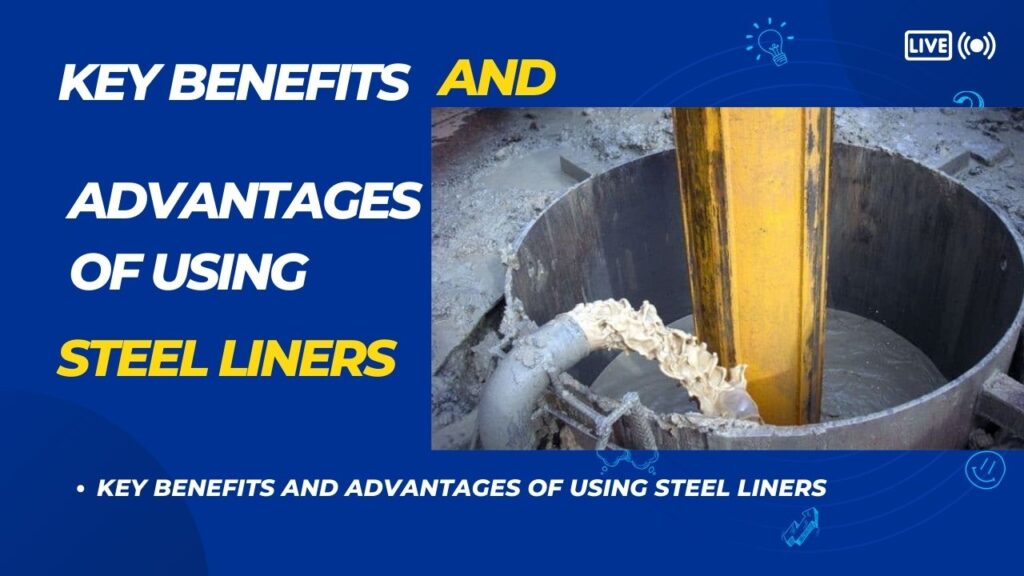
Key Benefits of Steel Liners:
- Soil Stabilization: Steel liners effectively prevent soil collapse and maintain the stability of the excavation, particularly in soft or unstable soil conditions. Without liners, the surrounding soil could cave in, compromising the integrity of the pile and potentially causing structural damage.
- Pile Formation Enhancement: Steel liners facilitate the construction of larger and deeper piles. They provide a stable cylindrical form for the concrete to be poured into, ensuring the proper shape and dimensions of the piles.
- Pile Protection: Steel liners act as a protective barrier around the piles, shielding them from corrosion and abrasion. This is particularly important in environments where the soil is prone to chemical or mechanical damage, such as in marine environments or areas with high water tables.
- Reusability: Temporary steel liners can be removed after the pile has hardened and is no longer susceptible to soil collapse. These liners can then be reused for other pile installation projects, offering cost-effective solutions.
Applications of Steel Liners:
Steel liners are widely used in various construction projects, including:
- Pile Foundations: Steel liners are extensively used in pile foundation construction, particularly for bridge piers, retaining walls, culverts, and utility tunnels. They ensure the stability of the piles and provide a reliable foundation for the overlying structures.
- Drilled Shafts: Steel liners play a crucial role in the construction of drilled shafts, which are deep, circular foundations used in various structures, including buildings, bridges, and towers. Liners prevent soil collapse and facilitate the formation of the shaft, ensuring its integrity and stability.
- Microtunneling: Microtunneling, a trenchless construction technique, utilizes steel liners to guide and support the tunnel excavation process. Liners provide stability and prevent soil collapse during the tunneling operation.
- Caisson Foundations: Caisson foundations, commonly used for offshore structures and deep foundations, employ steel liners to provide structural support and maintain the stability of the excavation. Liners ensure the integrity of the caisson during construction and throughout its service life.
The utilization of steel liners in various construction applications offers several key benefits and advantages. Here are some of the primary reasons why steel liners are widely preferred:
- Structural Integrity:
- Enhanced Strength: Steel liners contribute to the structural integrity of construction elements, providing increased strength and load-bearing capacity.
- Corrosion Resistance:
- Longevity: Many steel liners are manufactured with corrosion-resistant coatings, ensuring durability and longevity even in challenging environmental conditions.
- Versatility:
- Adaptability: Steel liners are versatile and can be customized to fit various shapes and sizes, making them suitable for a wide range of construction applications.
- Stability in Challenging Conditions:
- Suitability for Difficult Soils: In areas with challenging soil conditions, such as loose or waterlogged soil, steel liners provide stability and prevent ground collapse during construction.
- Water and Soil Retention:
- Prevention of Intrusion: Steel liners act as a barrier, preventing the intrusion of water and soil into construction elements like foundation piles, ensuring the stability of the structure.
- Ease of Installation:
- Streamlined Construction Process: The use of steel liners facilitates a more efficient and streamlined construction process, enabling accurate and controlled placement of construction materials.
- Alignment and Verticality:
- Guidance for Construction: Steel liners serve as guides during construction, helping maintain alignment and verticality, ensuring that the construction elements are built according to design specifications.
- Cost-Effectiveness:
- Long-Term Savings: The durability and longevity of steel liners contribute to long-term cost savings, reducing the need for frequent replacements or repairs.
- Environmental Sustainability:
- Recyclability: Steel is a highly recyclable material, contributing to environmentally sustainable construction practices by reducing the demand for new raw materials.
- Fire Resistance:
- Fire Safety: Steel liners offer high resistance to fire, adding a layer of protection to structures and enhancing overall safety.
- Quality Control:
- Consistency and Quality: The use of steel liners allows for better control over construction processes, ensuring a consistent and high-quality end product.
- Reduced Maintenance:
- Low Maintenance Requirements: Steel liners typically have low maintenance requirements, minimizing the need for ongoing repairs and upkeep.
In summary, the key benefits of using steel liners include their ability to enhance structural integrity, resist corrosion, provide stability in challenging conditions, retain water and soil, streamline construction processes, and contribute to cost-effectiveness and environmental sustainability. These advantages make steel liners a preferred choice in various construction projects.